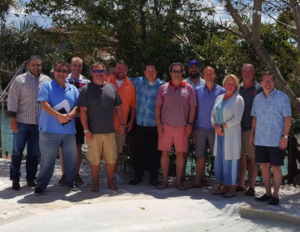6 Leadership Lessons Learned from the Founder of EO
August 21, 2018
 Michael Loban is an Entrepreneurs’ Organization (EO) member in Cincinnati and cofounder of InfoTrust, a digital analytics consulting and technology company helping marketers use data to make smarter decisions. Michael and his cofounder, Alex Yastrebenetsky, were recently invited to attend a CEO workshop with EO founder Verne Harnish. We asked Michael about his top takeaways. Here’s what he shared.
Michael Loban is an Entrepreneurs’ Organization (EO) member in Cincinnati and cofounder of InfoTrust, a digital analytics consulting and technology company helping marketers use data to make smarter decisions. Michael and his cofounder, Alex Yastrebenetsky, were recently invited to attend a CEO workshop with EO founder Verne Harnish. We asked Michael about his top takeaways. Here’s what he shared.
Happy World Entrepreneurs’ Day—21 August—to my fellow EO entrepreneurs who work hard and work smart 24/7 to make the changes they want to see in the world.
What better acknowledgement of World Entrepreneurs’ Day (WED)—a day devoted to celebrating the leadership and innovation that entrepreneurs bring—than by sharing lessons learned from the founder of EO, Verne Harnish? In addition to founding EO, Verne has coached thousands of entrepreneurs, launched Gazelles Growth Institute and authored bestselling books including Mastering the Rockefeller Habits and Scaling Up. (And that’s the short list.)
Luckily, my cofounder, Alex Yastrebenetsky, and I met Verne in 2015 when our entire leadership team attended a Scaling Up workshop. We stayed in touch, and Verne recently invited us to attend a CEO workshop. He doesn’t offer one-on-one coaching anymore, so these workshops provide him an opportunity to more closely connect with entrepreneurs.
And he does so in a setting unlike any other. As you’re probably (painfully) aware, most conferences are held in hotel facilities that all look the same and serve coldish, chewy chicken for lunch. But this was the learning event of a lifetime, held in serial entrepreneur John Ratliff’s jaw-dropping home in the Florida Keys.
Verne opened our CEO workshop with this anecdote:
An Irish man walks into a pub.
“What’ll you have?” the bartender asks.
“Give me three pints of Guinness, please,” says the man.
The bartender brings him three pints, and the man proceeds to sip them alternately—the first one, the next one, and then the third one, until they’re all gone. He then orders three more.
“Sir,” says the bartender, “I know you like them cold. You don’t have to order three at a time. I can keep an eye on you, and when you get low I’ll bring you a fresh, cold one.”
“You don’t understand,” the man says. “I have two brothers, one in Australia and one in the States. We made a vow to each other that every Saturday night we’d still drink together. So right now, my brothers have three Guinness Stouts too, and we’re drinking together.”
“What a wonderful tradition,” the bartender says, smiling.
Every week after that, the man comes into the bar and orders three beers. But one week, he orders only two. He drinks them, and orders two more.
“I know what your tradition is,” says the bartender sadly. “And I’d just like to say that I’m sorry that one of your brothers died.”
“Oh, me brothers are fine,” says the man. “I just quit drinking.”
At first, I didn’t make much of the story. However, by the end of the three-day retreat, I realized that Verne shares the same level of dedication to entrepreneurs as this Irishman does to his brothers.
Putting together a list of six things I learned at this retreat requires me to skimp on the other 93 things–though you can find seven more tips from Verne here.
Verne is brilliant at boiling leadership and growth down to its essence, so it’s applicable to companies making US$1 million or US$100 million. And so, his lessons will likely apply to your business, too. Here they are:
1. Own your niche: hyper-specialize.
Don’t make the common mistake of trying to be everything to every customer. Hyper-specialization and global sales are the keys to growth and big results.
Find your niche—typically less than 10% of the market—and then take steps to own at least 70% of that niche.
Here’s what Verne means: Don’t just provide marketing services to anyone who needs them. Become a marketing specialist for restaurants. Or better yet, be the marketing agency that provides regional marketing pay-per-click services for independent restaurants. Not only will it be easier to market your company to restaurants with similar business models, but you’ll be the proverbial big fish in a little pond you’ve created and rise to the very top.
When you own a niche, people associate words or word combinations with you. When companies think of you and your hyper-specialized services, what words come to mind? In such a competitive landscape, you want to have a phrase that clients and prospects associate with you. In essence, this phrase is what summarizes your “blue ocean”—the new, untapped market that is yours to cultivate.

Attendees at Verne Harnish’s retreat in Florida. Alex Yastrebenetsky (EO Cincinnati) is second from the left, Michael Loban (EO Cincinnati) is third from the left, Verne Harnish is first on the right, John Ratliff, the host and co-organizer with Verne, is fourth from the left.
2. Keep things simple for your team.
Complexity is the enemy of management. Reduce your time spent managing by 80% to enable your people to spend their time on the actual work and mastering their skills. How do you accomplish this? Build simple, repeatable operating processes and procedures that everyone understands and can follow.
3. Adopt the two behaviors of the most successful teams.
Verne shared a study from Google that, based on years of data collection and analysis, identified two behaviors of the most successful teams:
- Conversational turn-taking. In plain terms, this means that everyone gets to talk and a couple of people do not dominate the discussion. If that’s not how it goes in your organization, it’s time to make some changes.
- Average social sensibility. How sensitive are you to what others are thinking and feeling? How connected are you to the members of the team? It’s important to feel comfortable being vulnerable and sharing not only your successes, but your fears and failures, too.
Conversational turn-taking and sharing personal stories. Does that sound familiar? If you’re an EO member, you’ll know exactly what I am talking about.
These are two of the key guidelines for a successful Forum: Effective moderation with gestalt and lifeline exercise. My EO moderator coach says that if you’re not sweating or feeling a little nauseated when you are doing your lifeline, then you’re not going deep enough.
4. Remember: It’s all about relationships.
Verne emphasized multiple times how important it is to have a strategic network. He used the example of when he was launching EO and needed to network all the way up to Ronald Reagan, Steve Jobs and Regis McKenna.
The key exercise here is to concentrate on the specific types of people you need to connect with and make a list of 25 to 250 names (the higher and crazier the reach, the better). If you laser-focus on meeting people from that list, you will make it happen.
5. Read.
Verne is not the originator of the expression, “leaders are readers,” but his love for reading is next-level. The list of books that he quotes from and recommends seems endless. Here are a few titles from Verne’s list that I’ve recently read and are already making a big impact on my work:
- Confessions of the Pricing Man by Hermann Simon
- Goal: The Ball Doesn’t Go In By Chance: Management Ideas from the World of Football by Ferran Soriano
- Uncommon Service: How to Win by Putting Customers at the Core of Your Business by Frances Frei and Anne Morriss
6. Gather quick market intelligence.
It is marketing’s job to know what is going on in the market and educate the entire company. Make your customer-facing people collect data from the market and send the data to the marketing team, then have the marketing team release Quick Market Intelligence (QMI) reports.
Pro tip: Salespeople generally do not enjoy typing or sending reports. Have them dictate a report while driving and have your marketing team collect all these reports and incorporate into QMI.
I’ll close with a quote from one of our classmates, Mark Anderson, CEO of Anderson Hay. “I am always impressed by Verne and his incredible insight into business. He is a talented thought leader with a powerful network. Three days together on Marathon Key provoked incredible thought into where we are as a company and the opportunities ahead. Verne’s insight continues to empower me to never be afraid of asking the tough questions and looking at ways to change our industry.”
Are you a successful entrepreneur looking for greater challenges and learning opportunities? Then you’re ready to become a member of EO. Explore all the benefits of EO membership.